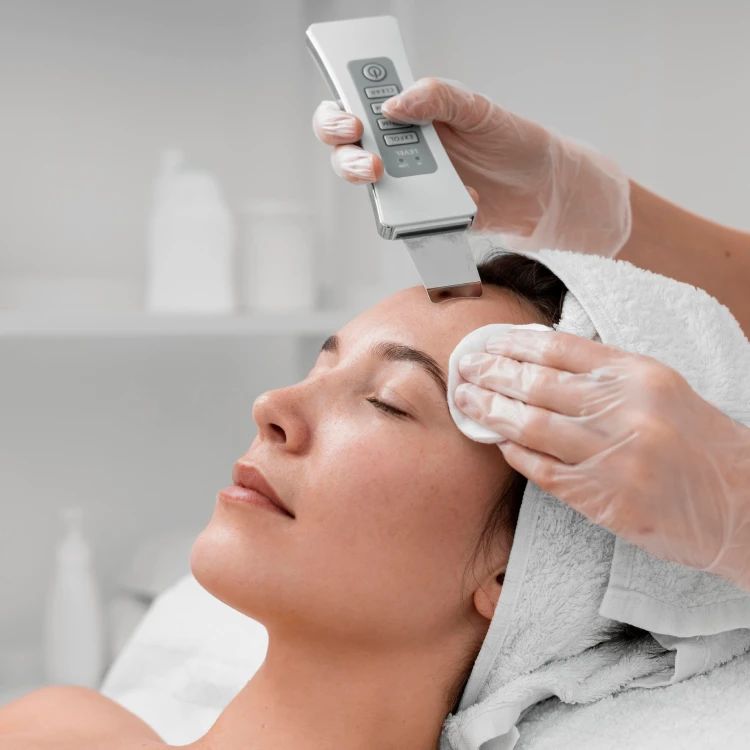Explore the Transformative Benefits of Dermaplaning for Your Skin
Stay in Touch
Sign up for our newsletter and get the latest info on specials, deals, promotions and beauty and health tips.
What is Dermaplaning?
Dermaplaning is a manual exfoliation technique that involves using a sterile surgical scalpel to gently shave off the top layer of dead skin cells and peach fuzz (vellus hair). This method reveals smoother, brighter, and more youthful skin. The procedure is usually performed by a licensed professional but can also be done at home with the proper tools.
For more details on the procedure, you can check out Healthline’s article on the dermaplane procedure..
Key Benefits of Dermaplaning
Exfoliation and Skin Renewal
Dermaplaning serves as an excellent exfoliating treatment, removing dead skin cells and promoting new cell growth. By eliminating the outermost layer of skin, the dermaplane process aids in cell turnover, leading to fresher and more resilient skin. This process can also help in reducing the appearance of acne scars over time.
Smoother Skin Texture
One immediate benefit of getting a dermaplane facial is the noticeably smoother texture of the skin. By removing the fine vellus hairs and dead skin cells, the skin’s surface becomes silky and even, reducing the visibility of minor skin imperfections and fine lines.
Enhanced Product Absorption
After the dermaplane process, the skin’s ability to absorb skincare products improves significantly. With the barrier of dead skin cells removed, serums, moisturizers, and other treatments can penetrate more effectively, ensuring that your skin gets the maximum benefit from your skincare regimen.
Improving Makeup Application
A smoother canvas allows for a more flawless makeup application. After the dermaplane facial process, foundation and other makeup products glide on effortlessly, helping to achieve a more professional and polished look without the interference of peach fuzz and uneven skin.
Who Should Consider Dermaplaning?
Suitable Skin Types
A dermaplane facial is generally suitable for most skin types, particularly those looking for a safe and effective way to exfoliate their skin. It’s ideal for individuals with dry or rough skin, mature skin, and anyone wanting to achieve a radiant glow.
Contraindications
While dermaplaning is effective for many, it’s not recommended for everyone. Individuals with active acne, rosacea, eczema, or those with very sensitive skin should avoid the procedure as it may exacerbate these conditions. Always consult a dermatologist to ensure it is appropriate for your skin type.
How to Prepare for a Dermaplaning Session Before the Appointment
Preparation is key to maximizing the benefits of dermaplaning. In the days leading up to the treatment, avoid any exfoliating products or treatments, such as chemical peels or abrasive scrubs. Keep the skin clean and moisturized but avoid heavy make-up on the day of your appointment.
Post-Care Instructions
After dermaplaning, protecting and maintaining your skin is crucial. Use a gentle cleanser and a soothing moisturizer, and avoid direct sun exposure. Always apply a broad-spectrum sunscreen to shield your freshly exfoliated skin from UV damage. Refrain from using makeup for at least a day post-treatment to allow your skin to heal and breathe.
At-Home Dermaplaning Tools
For those who prefer a DIY approach, many at-home dermaplaning tools are available. While convenient, it’s essential to follow proper techniques to avoid skin damage. Ensure your tools are clean and sterile before each use and follow professional guidelines for best results.
Frequently Asked Questions About Dermaplaning
Is Dermaplaning Safe?
Dermaplaning is generally safe when performed by a professional or when proper techniques are followed at home. However, there are minor risks, including cuts, abrasions, or infections if not done correctly. It’s vital to use sterilized tools and maintain hygiene to minimize these risks.
How Often Should Dermaplaning be Done?
The frequency of dermaplaning typically depends on individual skin type and concerns. Most professionals recommend treatments every four to six weeks to maintain optimal skin health and appearance. Over-exfoliation can harm your skin, so it’s crucial to stick to the advised schedule.
Conclusion
Dermaplaning offers numerous benefits, from smoother skin texture to enhanced product absorption and improved makeup application. It’s an effective treatment for many looking to rejuvenate and refresh their skin. Whether opting for professional sessions or trying it at home, dermaplaning can be a fantastic option for achieving radiant, healthy skin. Why not give it a try and experience the transformative benefits for yourself?
For more insights, you can visit WebMD’s in-depth overview of dermaplaning.

